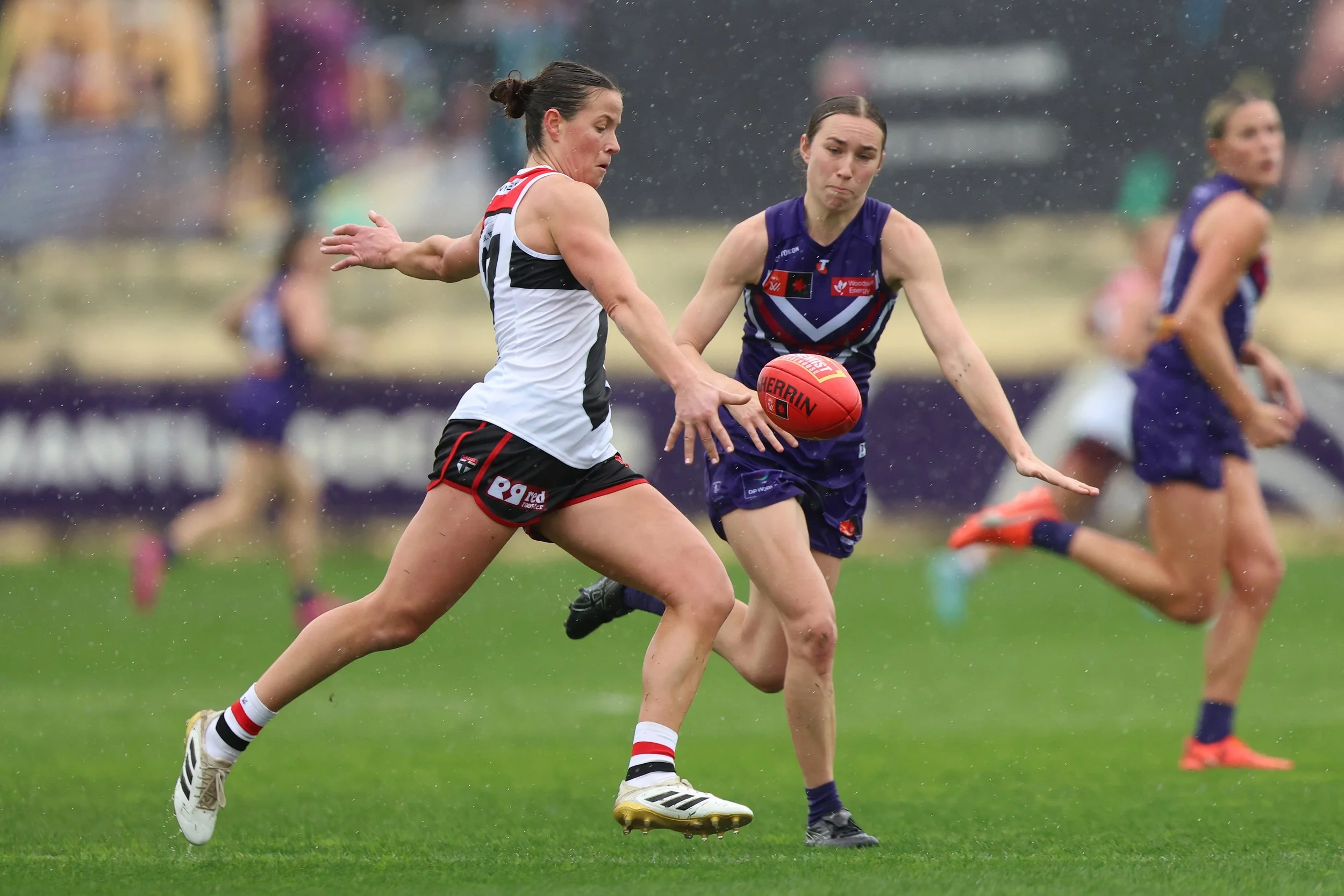Nicola Barr: Why I’ve joined the Fossil Free Declaration
Nicola Barr made history as the Sydney Swans’ first-ever Australian Women’s Football League (AFLW) draft pick, quickly establishing herself as one of the competition’s most consistent and thoughtful players. She now hones her game at St. Kilda FC in Melbourne.
Off the field, she’s emerged as a leading advocate for climate action in sport, working with FrontRunners as the project and engagement director to drive sustainability across Australian sport and help athletes use their voices to advocate for the climate and environment. Combining her background in environmental science with her sporting platform, Barr is helping to redefine what leadership looks like in an age of climate breakdown.
Nicola chatted with Cool Down about why she joined the Fossil Free Declaration and what she hopes to achieve through it.
-
Australia is on the frontline of the climate crisis. How has climate breakdown disrupted your ability to train and compete at the elite level?
Like you said, Australia is a land of extremes. Over the last few years we've seen it all - from bushfires to floods. In 2019/2020, when Australia had the Black Summer Bushfires, I remember running out to training in Western Sydney in apocalyptic conditions. The sky was orange and you could smell the smoke as we warmed up. We had to reschedule training or cancel it altogether. We've also played games in 36-degree heat, where the heat policy has needed to be implemented (longer breaks, more water runners allowed on the ground), and had games disrupted due to major storms. It's not me I'm worried about as much, though. Whilst these disruptions are concerning, at the elite level we have a lot of resources and are lucky enough to be able to adapt. My concerns are absolutely with grassroots sport, where they don't have the resources to adapt. Sport was a huge part of my young life. It allowed me to build new skills, meet people, feel a sense of belonging. I'm concerned that future generations of kids won't be able to have the same opportunities I did to play sport.
You have spoken before about how much joy being in nature brings you. Why do you think that sport is well placed to protect the climate and nature?
In Australia and around the world, sport is a cultural institution. It's where we come together, celebrate wins, and commiserate with our teams' losses. Sport inspires us. With so many passionate fans and followers, sport has an unbelievable ability to inspire positive change in our communities. Athletes are role models for the next generation, and many of them are concerned about the impacts of climate change. Over time, we've seen how sport can inspire positive change in the world. This is no different - sport has the platform and reach to change our hearts and minds, and show us what's possible for a better future.
In Australia, there is a groundswell of athletes, in your sport and beyond, speaking out against high-carbon sponsorship. Why do you think this is and what can the rest of the sporting community learn from the Australian experience?
Athletes rely heavily on sponsorship to sustain their careers - it's the backbone of how sport is funded. That said, there's a growing awareness around the issue of social license, especially when it comes to high-carbon sponsors. Many athletes here in Australia who care deeply about climate change have felt conflicted or stuck, knowing their values don't align with the companies funding their sport. But what's shifting in Australia is that more athletes are finding the confidence to speak up - largely because they feel backed by their peers and by athlete-led movements. We're also seeing more partnerships with climate-conscious brands, showing that there are viable, positive alternatives. This change signals that the sporting community doesn't have to be dependent on high-carbon sponsors forever, and that there's a way forward that aligns sport with climate responsibility.
Tyson Bennett via Unsplash
Why do you think initiatives like the Fossil Free Declaration are important? What do you hope it will achieve?
Initiatives like the Fossil Free Declaration matter because they give athletes a collective voice, especially on complex and often controversial issues like high-carbon sponsorship. Speaking out alone can be daunting, but when athletes unite, it builds a sense of solidarity and strength. I hope this declaration sends a clear message - not just to governing bodies and organisations we represent, but also to the high-carbon sponsors involved in sport - that continuing to use sport as a tool for sportswashing carries significant reputational risks. Ultimately, it's about pushing for more ethical, climate-aligned partnerships in sport, so that we can reduce the influence of high-carbon sponsors who are putting our sports, and the lives we live, at risk.
If you had a message for other athletes in your sport, what would it be?
Two things:
First, if you care about the climate, you're not alone. There's a growing network of athletes and organisations ready to support you - no matter how you choose to express that care.
Second, as athletes, we know the pressure that comes with contracts, team dynamics, and public expectations. It can be hard to speak up, especially when the risks feel personal. But we also need to recognise the influence we have. Whether it's using your platform publicly or having a quiet conversation with a teammate or your club, those actions matter. People notice what we do, they listen, and they're inspired by us. We're in a powerful position to drive positive change - and with that comes the chance to shape the kind of legacy we leave behind. Sport is temporary, but the impact we make can last well beyond our careers.


